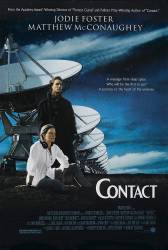Character mistake: When they first receive the alien signal, they decode it and play it as a TV signal which shows Hitler speaking at the opening of the 1936 Summer Olympics in Berlin. Kent translates what Hitler is saying as "I declare the Games in Berlin, at the celebration of the first Olympics of the New Era, as opened." Hitler actually says "the *eleventh* Olympics of the New Era." The "New Era" doesn't refer to some Nazi concept, it's used to separate the modern Olympics from the ancient ones in Greece.

Contact (1997)
1 character mistake - chronological order
Directed by: Robert Zemeckis
Starring: Matthew McConaughey, John Hurt, Jodie Foster, Tom Skerritt, David Morse, Jena Malone, Geoffrey Blake
Factual error: The geography around the VLA in New Mexico is actually relatively flat - in fact one of the reasons why the array complex is there is because the land is flat. The canyon in the film was actually Canyon de Chelly, in Arizona, more than 170 miles (270 km) away. But in the film, when Ellie goes to the canyon, the radio antennas seem to be right there, insinuating that the canyon is part of the VLA's magical desert scenery.
Panel member: If you were to meet these Vegans, and were permitted only one question to ask of them, what would it be?
Ellie Arroway: Well, I suppose it would be, how did you do it? How did you evolve, how did you survive this technological adolescence without destroying yourself?
Trivia: The film's opening shot, zooming out from the Earth to outside the galaxy, held the record for the longest completely computer-generated shot for seven years until The Day After Tomorrow in 2004.
Question: If you read the book version of Contact you know that the stuff about transcendental numbers and the Artist's Signature was left out of the movie. This makes no sense to me, since it's not only the real ending, it's the whole POINT of the story. Without this information, the story's fundamental question (does God exist?) is not answered in the movie. Does anyone know why this was left out?
Answer: The film chooses to focus on Ellie's personal journey and how she deals with and comes to terms with what happens - it doesn't really involve God at all, other than the inclusion of Palmer Joss as a religious advocate, choosing to restrict itself to the much less theologically controversial theme of a straight first contact scenario, without the religious overtones. Given the depth of feeling on religious matters in the US, it's hardly surprising that the filmmakers preferred to leave this particular hot topic out. While Carl Sagan died during production of the film, he both co-produced and was involved in the story process, so he was clearly not concerned about this change.
Join the mailing list
Separate from membership, this is to get updates about mistakes in recent releases. Addresses are not passed on to any third party, and are used solely for direct communication from this site. You can unsubscribe at any time.
Check out the mistake & trivia books, on Kindle and in paperback.




Answer: If anything, I think the film's producers deliberately left godly topics unaddressed (and questions dangling, unanswered) because they didn't want to alienate any particular audience. However, we know the producers of "Contact" certainly did vilify religion through the sinister scenes with Joseph, the evangelical extremist. At the same time, the film created empathy for the president's glib theological adviser, Palmer Joss. So, I don't think the film was shying away from religious topics, and I think it was pretty fair to the religious viewpoint, for the most part. But this movie wasn't about religion; it was about a primitive, materialistic, self-centered and aggressive species (humanity) reluctantly acknowledging the existence of vastly more intelligent and even godlike entities throughout the cosmos. Even the first-contact entities, advanced as they are, acknowledge other entities much more ancient and much more advanced (the virtual architects of the space/time conduit). The implication was that we live in a universe that may be populated with many intelligent entities that answer every human criteria of godhood. Ellie's narrow-minded atheism was surely shaken to its foundation by her experience; and, while she didn't "convert" to archaic earthly religions, she was spiritually a different person upon her return. The film, however, is open-ended and fence-straddling and doesn't presume to definitively answer the question of the existence of god, leaving it up to the audience to decide.
Charles Austin Miller